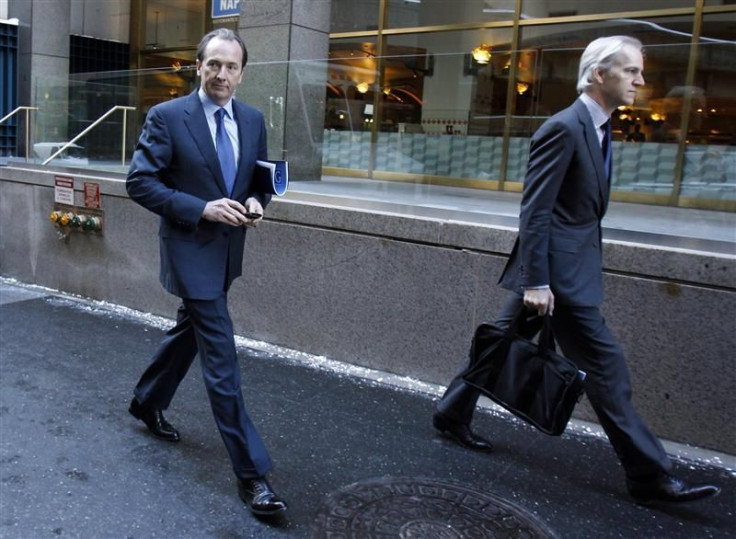Morgan Stanley Buying Discount Broker E-Trade Financial For $13 Billion

KEY POINTS
- Morgan Stanley will buy E-Trade at a 30% premium
- E-Trade has 5.2 million customer accounts and $360 billion in retail client assets
- The deal is designed to boost Morgan Stanley's wealth management unit
Morgan Stanley (MS) has agreed to acquire online discount brokerage E-Trade Financial (ETFC) in a stock deal valued at $13 billion.
The transaction marked the biggest takeover by a major U.S. lender since the 2008 financial meltdown.
Under terms of the deal announced on Thursday morning, Morgan Stanley will buy E-Trade at $58.74 per share – about a 30% premium.
Specifically, E-Trade stockholders will receive 1.0432 Morgan Stanley shares for each share they own.
E-Trade boasts 5.2 million customer accounts and $360 billion in retail client assets.
Morgan Stanley presently has $2.7 trillion in assets – mostly linked to large companies and wealthy individuals.
“This [deal] continues the decade-long transition of our firm to a more balance-sheet-light business mix, emphasizing more durable sources of revenue,” said James P. Gorman, Morgan Stanley’s chairman and chief executive in a statement.
The merger, Gorman added, will combine Morgan Stanley’s “full-service, adviser-driven model” with E-Trade’s “direct-to-consumer and digital capabilities.”
The deal is designed to boost Morgan Stanley's wealth management unit, which Gorman has wanted to upgrade in order to protect the bank from downturns in trading and investment banking.
“E-Trade represents an extraordinary growth opportunity for our wealth management business and a leap forward in our wealth management strategy,” Gorman said.
CNBC reported that at closing Morgan Stanley will have expanded its franchise with a direct-to-consumer brokerage platform in addition to its premier investment bank and high-end financial advisers.
Morgan Stanley “will look to couple their advisor-driven model with [E-Trade’s] direct-to-consumer and digital capabilities,” said Piper Sandler analyst Richard Repetto. “As a result this will widen, while potentially enhancing, [Morgan Stanley’s] current offerings.”
CNBC noted that wealth management will account for nearly 60% of the combined firm’s pretax profits, thereby providing a cushion against the more volatile activities like institutional trading of stocks and bonds.
Subject to approval by E-Trade shareholders and regulators, the proposed transaction is expected to close in the fourth quarter of this year,
“We’ll take on Schwab. We’ll take on Fidelity,” said Gorman. “This isn’t about legacy-building; it’s about getting [Morgan Stanley] ready for prime time.”
E-Trade’s chief executive officer, Michael Pizzi, will remain in charge of the business.
E-Trade has endured a struggle since last autumn when Charles Schwab (SCHW) wiped out fees for the trading of stocks and exchange-traded funds. Schwab then agreed to purchase TD Ameritrade (AMTD) for $26 billion.
E-Trade has also been pressured by digital upstarts, slipping commissions and lower interest rates.
The Wall Street Journal reported that E-Trade’s “crown jewel” is their lower profile business of managing stock that employees at hundreds of companies receive as part of their compensation. E-Trade is now seeking to move these employees into their brokerage accounts.
After purchasing E-Trade, Morgan Stanley will have more than 4,000 corporate customers and $580 billion of stock held on behalf of these employees.
The Journal noted that the 61-year-old Gorman has reduced Morgan Stanley’s exposure to riskier trading activities and focused more on steadier businesses like lending and wealth management. Last year, Morgan’s revenue reached an all-time high of $41 billion.
“We’re strong now, and I believe you move from a position of strength,” Gorman said.
Gorman has reportedly been interested E-Trade since 2002 when he worked as an executive at Merrill Lynch.
Gorman explained that E-Trade became more amenable to a takeover from the chaos caused by Schwab late last year.
Morgan Stanley expects to make up for the premium it’s paying for E-Trade through $400 million of cost cuts and savings of $150 million by using E-Trade’s low-cost deposits to substitute for more expensive funding.
© Copyright IBTimes 2024. All rights reserved.





















